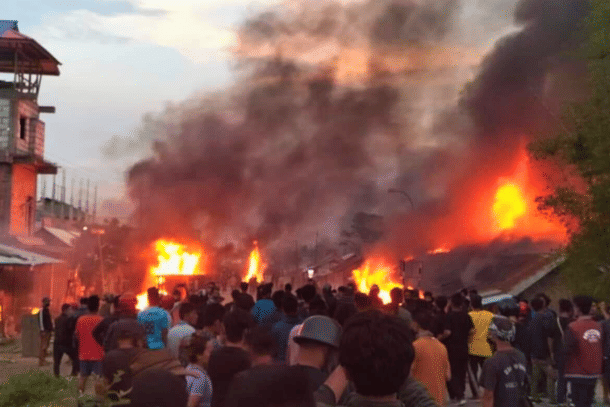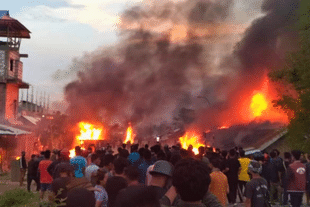Politics
What We Know About The Manipur Unrest So Far
Swarajya Staff
May 05, 2023, 06:44 PM | Updated 06:44 PM IST
Save & read from anywhere!
Bookmark stories for easy access on any device or the Swarajya app.


Why it happened
The protests erupted as a result of a High Court order asking the State government to submit recommendations to the Centre on the plea seeking recognition of ST Status by the majority Meitei community of the state, represented by the Meitei Tribe Union (MTU).
In response to the order, the All Tribal Students’ Union of Manipur (ATSUM) and other tribal bodies organised ‘Tribal Solidarity Marches’ and widespread organised protests across the states, opposing the HC order.
The Meitei community, who are mostly Hindus by faith, constitute around 53 per cent of the population of the State.
The Kuki and the Naga tribes, mostly Christians, constitute about 30 per cent and 15 per cent of the population of the State, respectively, and mostly occupy the hill districts.
The Meiteis have always had a longstanding demand for over ten years seeking ST status, alleging that unchecked widespread illegal migration from the neighbouring states of the tribes has led to an unreasonable encroachment on state property and reservation benefits to them, along with an increasing threat to its culture, faith and society.
The Kuki and Naga tribes, on the other hand, contest that the reservations are essential for them considering the dominance of the majority Meitei community in legislature and other important offices and professions.
Amidst this existing ethnic fault line, and in the backdrop of recent evictions of the Kuki tribes by the state authorities claiming illegal encroachment of forest areas, the tensions were heightened by the High Court order, leading to widespread violence, riots, and arson.
When the main events occurred, and status quo
Below is a timeline of the events as they occurred, putting in context the clashes and the actions that transpired after the same.
21 February 2023: Authorities carry out eviction drives against Kuki establishments near K Songjiang in the Churachandpur district. Kukis offer fierce resistance and results in protests and clashes, leading to resentment amongst the Kukis.
19 April 2023: The High Court at Imphal passes an order directing the state to submit to decide and submit recommendations to the Centre on the plea of the Meitei community on seeking ST status.
2-3 May 2023: The ATSUM calls for ‘Tribal Solidarity Marches’ Protests across the state, triggering severe clashes and violence across the state. With the situation of worsening law and order, the Army, Assam Rifles, and state police are deployed to bring it under control.
4 May 2023: The ethnic clashes spill over to neighboring border states, with clashes and skirmishes reported in Meghalaya and Nagaland. Union Home Minister gets in touch with Chief Ministers of the adjoining states to seek status on the state response and ensure it is dealt with in order.
By evening, Centre imposes Article 355 in the State, taking over law and order. Security forces issue ‘shoot-at-sight’ orders, leaving authorities on edge. Meanwhile, mob attacks BJP MLA Vungzagin Valte, a Kuki himself, who remains in critical condition.
5 May 2023: No new clashes, but situation continues to remain tense.
Takeaways
While the imposition of Article 355 by the Centre serves as a setback to CM N Biren Singh, the clashes highlight the issues of illegal migration and cultural and demographic changes that continue to stroke the communal and ethnic fires in the northeastern states.
The Meitei community’s call for implementation of the NRC in the recent past has also been in this backdrop.
The Centre and State authorities will now have to delicately deal with the demands for reservation of the majority Meitei community vis-à-vis the issue of illegal immigration, changing demographics and religious-ethnic fault lines.
This comes as the BJP government at centre has been at the front in bringing northeast in focus for developmental, infrastructural and educational projects, alongside its attempt at settling strongholds of electoral power in the region.





